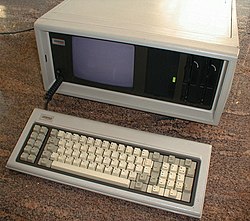Ancient history
I played trombone and piano in high school. I played electronic keyboards (including a Moog Prodigy, my first synth) in a couple bands. I wasn’t a very good musician but I enjoyed it.
I went to Oberlin College 1982–1986. I did a major in philosophy and a minor in religion. Although the Oberlin Conservatory didn’t offer a major in electronic or computer music back then, I did a major’s worth of those courses. I took just two computer science courses: assembly language and Pascal. That turned out to be good preparation for teaching myself C later.
In projects for computer music, I loved Turbo Pascal. It’s remarkable that, all these years and MHz and GB later, virtually no programming environment is faster.
 .
.
I used Turbo Pascal first on the school’s Osborne CP/M PCs, and later on my own Compaq Portable with MS-DOS and a Plus Development Hard Card. The latter let you add a real hard disk drive, with a whopping 10 MB of capacity. (That’s not a typo: megabytes, not gigabytes.)
I graduated in 1986 and moved to Boston because some friends from Oberlin were headed back there. I procrastinated getting a real job, doing a little temp work. I decided to write a MIDI sequencer, starting over this time in C.
Around April 1987 I decided to take out an ad in Electronic Musician magazine and see if I could sell a few copies of the software, which was called Cakewalk. (I named the “company” Twelve Tone Systems. Later we renamed the company to Cakewalk, too.)
Where did the name Cakewalk come from? Just before the deadline for the first ad, I discovered the original name (“Opus”, if I recall correctly) was already used. During a last-minute search through Schirmer’s dictionary of musical terms, I noticed “Cakewalk”. I liked the connotation of ease-of-use, which matched my goal for the software. I liked that it was a simple, compound English word everyone would know how to spell and pronounce.